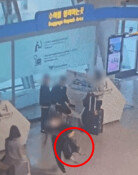Small holes can break down the entire wall
Small holes can break down the entire wall
Posted March. 20, 2020 07:40,
Updated March. 20, 2020 07:40
Just in four days, the number of new COVID-19 cases went over 100 again on Thursday as 152 people tested positive including those at a care facility in Daegu, while the fatality rate in the nation rose over one percent for the first time. Meanwhile, the combined number of cases in Europe surpassed that of China where the virus originated, becoming a new hotbed.
Figures from the last week reflect this new trend, especially in Seoul where 24 percent of new cases were those who arrived from Europe including students and travelers. It is concerning given that they were not diagnosed at the airport because they did not show any symptoms.
From Thursday, the South Korean government extended special health screenings, which involve temperature and contact checks, to everyone who arrives from overseas. However, some argue that a travel ban should be put in place considering the virus is spreading across the globe. Currently, 170 countries have already imposed a travel ban on those who travel from South Korea. The government should at least consider mandating all visitors to self-quarantine for 14 days if it is difficult to close borders to other nations when they have remained open to China since the early phase of the virus outbreak.
Three South Korean fencers tested positive for the novel coronavirus after returning from an international tournament held in Hungary, and it was revealed that one of them traveled across South Korea, not following the self-quarantine guidance. The authorities should share the list of arrivals with local governments so that they can closely monitor the quarantine process.
Meanwhile, there have been reports of complacency as new confirmed cases slow down. One patient was sent home from Incheon International Airport. The screening team explained it was due to the lack of quarantine facilities, but it can only be seen as a lame excuse especially because it has been more than two months since the first case was confirmed in South Korea. The screening team at the airport should move quickly to expand quarantine facilities while setting up a hotline with all local governments to discuss how to transport those with suspected COVID-19 symptoms.
Bundang Jesaeng Hospital in Gyeonggi Province, which reported more than 30 confirmed cases, issued a public apology on Thursday for omitting 144 people including the director of the hospital. The hospital submitted to the government the list of employees who came into contact with those who contracted the virus. The Hansarang nursing hospital in Daegu where more than 70 people were diagnosed with the virus aggravated the issue by not taking any action even though several employees showed symptoms around last Tuesday. Medical institutions are one of the most vulnerable facilities along with public spaces where small-scale cluster infections occur. If we become complacent, these small vulnerabilities will break down the entire wall of contamination.







